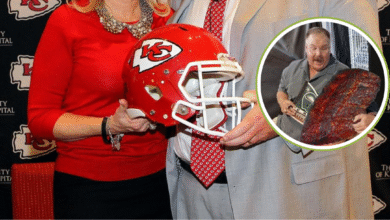Tyson and Holyfield – The Secret Apology After the Bite
OPINION: This article may contain commentary which reflects the author's opinion.
On June 28, 1997, the world watched in stunned disbelief as Mike Tyson, the once-invincible “Iron Mike,” committed one of the most infamous acts in sports history. In the third round of their heavyweight rematch at the MGM Grand in Las Vegas, Tyson bit Evander Holyfield’s ear, not once but twice, tearing off a piece of cartilage in a moment that would define his legacy as much as his knockouts. The crowd roared, the referee disqualified Tyson, and the media frenzy began. Tyson was vilified, fined $3 million, and had his boxing license revoked. But behind the headlines, in the quiet aftermath of that chaotic night, a story unfolded that no journalist captured, a story of vulnerability, regret, and a desperate plea for redemption.
It was two days after the fight, in a nondescript hotel room on the outskirts of Las Vegas, that Tyson requested a private meeting with Holyfield. The request came through backchannels—managers whispering to managers, intermediaries ensuring no press would catch wind. Holyfield, still nursing his wounded ear and the shock of the incident, agreed, though his team urged caution. “Evander’s a man of faith,” one of his trainers later recalled. “He believed in second chances, even for Mike.”
The room was small, lit by a single lamp, with a table and two chairs. No cameras, no witnesses, just Tyson and Holyfield. Tyson entered first, his head bowed, his usual swagger replaced by a heaviness that seemed to pull him to the floor. Holyfield arrived minutes later, his face unreadable but his posture calm, almost serene. What transpired over the next hour would remain a secret for years, known only to the two men and a handful of trusted confidants.
Tyson began by apologizing, but it wasn’t the rehearsed, public-relations script the world would later hear. According to a source close to Holyfield, Tyson dropped to his knees, tears streaming down his face, and begged for forgiveness. “I’m sorry, Evander,” he said, his voice breaking. “I was scared. I was losing, and I couldn’t handle it.” The confession was raw, a window into the psyche of a man who had built his career on fearlessness but was now unraveling under the weight of his own demons.
The bite, Tyson admitted, wasn’t just an act of frustration. It was a cry for control in a fight where he felt powerless. Holyfield, the disciplined, unflappable champion, had dominated their first encounter in 1996, ending Tyson’s comeback dreams with an 11th-round TKO. In the rematch, Tyson sensed early that history was repeating itself. “I saw my whole life slipping away,” he told Holyfield. “The money, the fame, everything I fought for. I didn’t know what else to do.”
Holyfield listened in silence, his eyes fixed on Tyson. For a man who had just endured a brutal violation on the world stage, his composure was remarkable. When Tyson finished, Holyfield spoke, his voice steady but firm. “Mike, you’re more than this,” he said. “You’re not the animal they say you are. But you’ve got to face yourself.” Those words, according to the same source, struck Tyson like a punch he couldn’t dodge. For the first time, he saw not just an opponent but a mirror—one that reflected both his potential and his flaws.
The meeting didn’t erase the consequences of Tyson’s actions. The Nevada Athletic Commission upheld his suspension, and the public’s perception of him as a volatile, unpredictable figure solidified. But for Tyson, the encounter was a turning point, albeit one he kept private. He later hinted at it in interviews, saying he and Holyfield had “made peace,” but the details—the kneeling, the tears, the confession—remained locked away, a sacred moment between two warriors.
Years later, in 2009, when Tyson and Holyfield appeared together on The Oprah Winfrey Show, their reconciliation seemed genuine, even heartwarming. They laughed, embraced, and spoke of mutual respect. But few knew the true origin of that peace: a hotel room in 1997, where Tyson bared his soul and Holyfield offered not just forgiveness but a challenge to rise above. It was a moment that humanized Tyson, revealing the frightened boy beneath the ferocious facade, and it underscored Holyfield’s quiet strength, a champion in character as much as in the ring.
The secret apology didn’t change the headlines or the history books. Tyson’s bite remains a stain on his career, and Holyfield’s victory that night is a footnote compared to his broader legacy. But for those who know the story, it’s a reminder that even in the brutal world of boxing, redemption is possible—not in the spotlight, but in the shadows, where two men found a way to heal.



